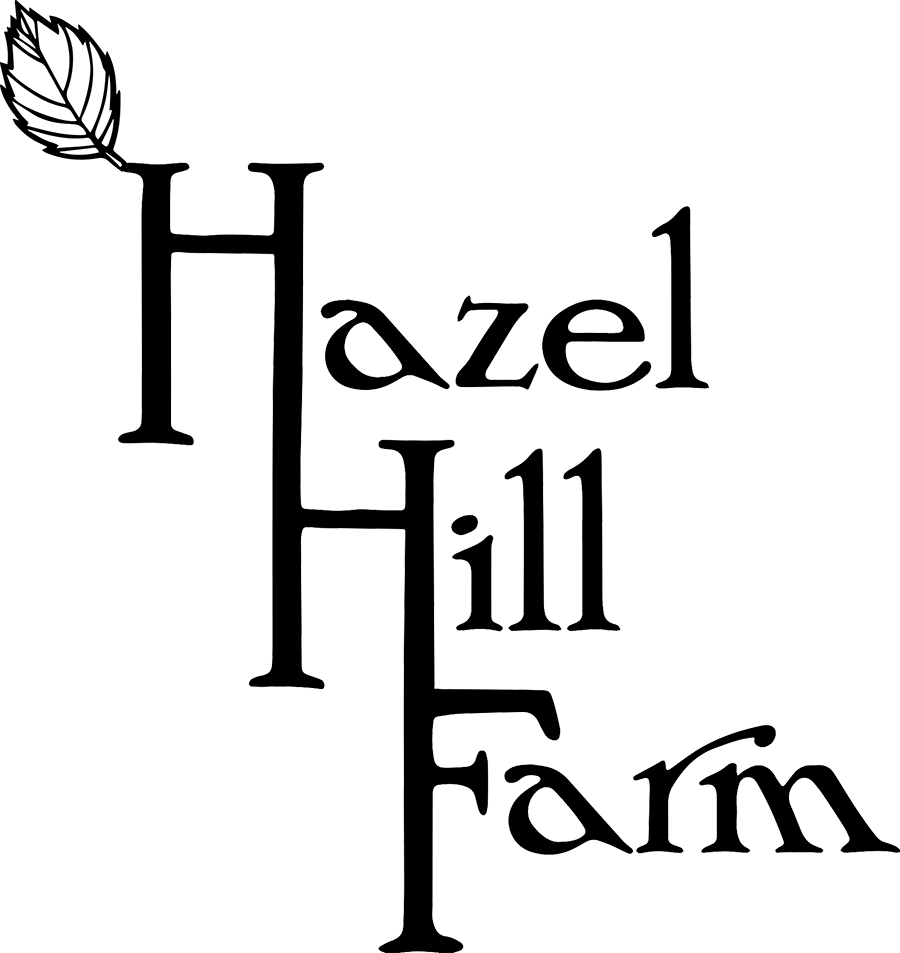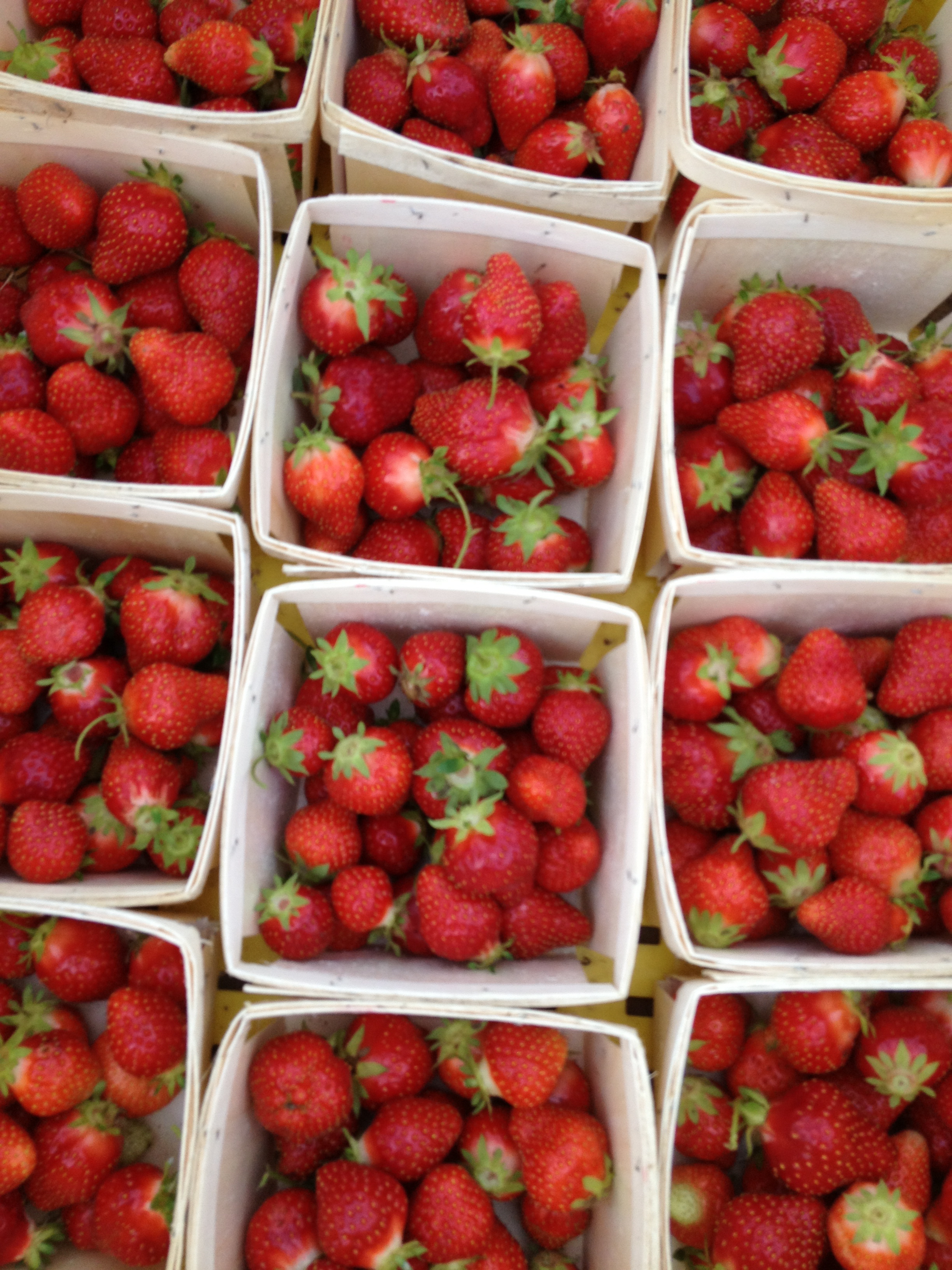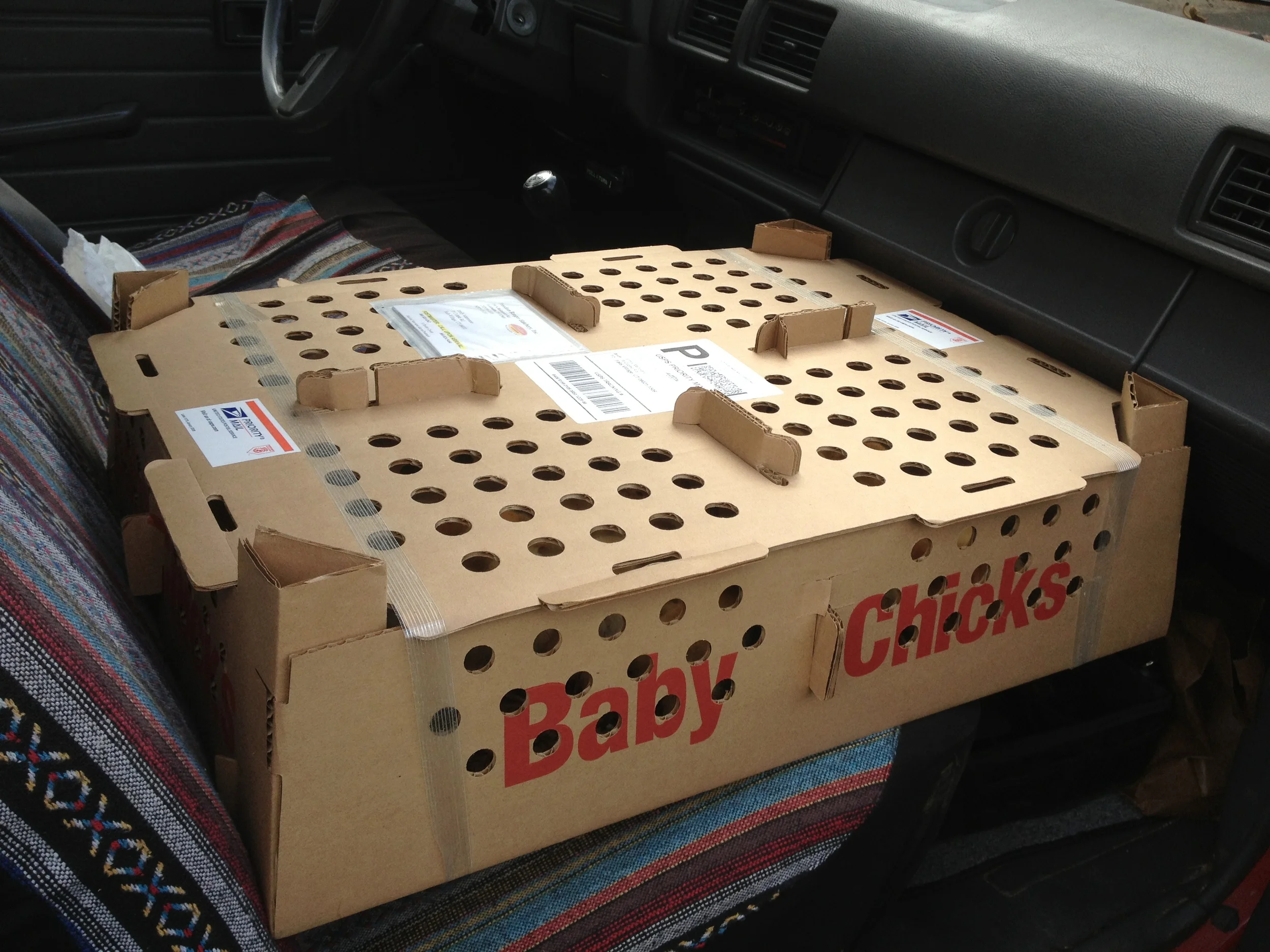It’s five-o’clock, and my last fieldwork colleague of the day is leaving the field, pushing a wheel hoe and dangling an empty water bottle from his pinky. It’s been a hot day, humid and sunny with an occasional cooling breeze. My legs and arms are covered in dirt, striped with lighter brown where sweat or water has pushed the dust aside. I pick up the notebook where this morning I had made myself a ridiculous list while slowly driving the length of the field in the golf cart (partially out of laziness, partially to avoid getting my shoes soaked in the dewy grass, and partially because it’s much easier to write when sitting down). This morning I flipped the half-sized spiral notebook on its side and scrawled headers along the top: HORSES, WHEEL, RAZOR, HAND, TILL. As I slowly bumped down the headland, I noted which beds needed which kind of attention, sometimes noting other tasks down in the corners (“pull bolted chi. cabb,” “HARVEST BROCCOLI TODAY!”). As the field crew swelled to three, then four, then shrank back down to two, we moved across the field, erasing weeds and crossing items off the list. The eggplants and peppers just needed a quick pass with a razor hoe, but the extra-wide lanes on either side of the tomato trellises needed some attention from the wheel hoe, and so on and so forth across the field.
Now, standing in the field looking down at the notebook, we have made a large dent in my list but I feel to desire to leave the field. The Brussels sprouts I just finished hoeing could really use some water, I think. After an early and epic cutworm plague this spring, we have recently transplanted a late but optimistic batch of seedlings into the gaps left by the decimation, and these small plants are looking a little wan. I’ll stay a little longer, I decide - long enough to irrigate the sprouts and cross another few items off my list. Besides, after a very sweaty day, the air is just starting to feel nice again, and I’m really on a roll.
I walk a few rows further into the field to retrieve the irrigation rig where it was left after providing some moisture to speed the germination of some broadcasted and culti-packed oats, rape, and buckwheat. The rig is new this year, a collaborative effort. Danielle’s least favorite part of farming is dealing with hoses and row covers, which can be notoriously frustrating. I suggested that half the headache of hoses in the field might be solved by some sort of cart with a hand-cranked wheel sturdy enough to hold the 200’ of hose that we require, eliminating the untangling step from the hosework. Danielle mentioned this to Mat, who went out and bought one the very next day. I assembled it, grabbed a wobbler, and went out to the field ready to put it to good use. When Mat came out to see how it was working, he looked at it and decided it would be even more useful if you didn’t have to turn it off, walk into the field and pick up the wobbler when you wanted to move it. A few tweaks later, we had a working system: two wobblers separated by about 30 feet of hose (so their respective spray radii overlapped slightly), each affixed to a block of wood cut into a boat-like skid with stolen training wheels keeping the skids from tipping over. (Incidentally, robbing an outgrown bike of its training wheels inadvertently caused to teach himself Shep to ride a two-wheeler in one afternoon!)
I balance these two skids on the cart as I wheel it back over to the sprouts, dragging the heavy water-filled hose behind me in the grass. I count the rows I’d like to soak - it’s too bad the cauliflower will be just out of range, but the sprouts seem more important in this moment. I choose the appropriate pathway, position the cart so the hose unspools unobstructed, and start to walk the sprinklers towards the end of the bed. In my left hand, the sprinkler dangles in its skid, impotently gurgling with every heave. The hose passes over my shoulders, and I grasp it firmly in my right hand as I drag the second sprinkler in its skid the length of the row. It comes easily at first, but as I near the bottom of the bed, I lean into it to heft the heavy length of hose. Heading back up to the top, I turn the valve mounted on the cart and listen as water makes its way through what’s left of the coiled hose before rushing down the field and wobbling the sprinklers in a few awkward loops before settling into the familiar circular arc of gentle summer rain. I’m thirsty. My thermos is in the newly refurbished and red-painted garden cart a few yards away, but I know it’s empty again. If I walk in and refill it now, I decide, I can pull the wobblers up one length on the way back out. Perfect.
I walk slowly towards the house, admiring the clean beds we have to show for our day’s work. The yard is deserted - the boys are at their grandmother’s this afternoon, Danielle is across the street doing some landscaping work at the landlord’s summer house (part of the arrangement that made starting this farm possible), and Mat is off in a farther field, checking on the condition of some hay that needs to be baled. Bella, a recent canine addition to the farm, comes to greet me, and we go together into the dark kitchen. I have taken my shoes off as always, though when I wear these old boat shoes I often think I’d be better of leaving them on, as my feet seem to carry more dirt in than the treadless soles might. I down the first ice-water refill without taking a breath - is this my fourth or fifth bottle-full today? Fifth, I suppose, as I fill up my sixth.
Out in the field, I stop at the hose, where the furthest sprouts seem sufficiently soaked. As I pull the hose in, grasping tightly and using the strength of my legs to walk it back, I think about non-specific old-timey sailors, heave-ho-ing thick ropes and coiling them on the deck of a ship - three-masted? Maybe they’re animated - this must be from The Little Mermaid, or maybe Peter Pan. They would be singing, either way. The beans, I’m going to hoe the beans. Earlier in the day and the field, Lindsay weeded our second planting of beans with a cobrahead - three rows? Four? I’m looking at five rows here, three rows with a nice thick germination, our third planting, and two sparse rows that remain from our previously lush and larger first planting that was damaged by a late frost. I select the razor hoe as my tool of choice for the younger, smaller plants. The grass and weeds are close to the bean plants, but easy to remove with some skilled maneuvering. I go down one side and up the other, sweeping under the bean canopy for hidden weeds. I pass through the outer reaches of the spray - refreshing! I don’t slow.
I love using a razor hoe, especially when it’s the right tool for the job, In this case, it’s about 85% the right tool. When is it 100% the right tool? When forces converge to make my day: when the crop has been horse-cultivated, leaving on the area closest to the crop and between plants untouched but breaking the crust and clearing away weeds from the sides of the bed and the pathways; when the weeds themselves are small enough that just to move them is to kill them (what some call the white thread stage); when the soil is not so dry as to blow away but not so moist as to stick to the blade; when the plants are spaced so that the blade can pass between easily, but not so far as to require multiple swipes. This confluence of conditions makes me irrationally happy - I hold personal time trials (200 feet in 10 minutes is my prime condition average), I mention prime-hoeing-conditions so subtly (not) that Danielle relents as quickly as is feasible, letting me go off and hoe by myself. I confess to hoarding prime hoeing conditions, but I rationalize this irrational behavior by telling myself that for others it would only be another chore slightly less onerous while for me it is capable of inciting utter joy and satisfaction.
Tonight, however, does not bring me prime hoeing. Perfectly pleasurable for the first three rows, but nothing quite so sublime as PHC (Prime Hoeing Conditions seems to require an acronym, all of the sudden). After three rows of young beans, the sprinklers moved up another few lengths, a few more podcasts listened to, I come to the oldest, crankiest beans. I take a few swigs of my still-ice-cold water (all hail vacuum-insulated thermoses!) and regard them somewhat askance. These are far from PHC, but they must be tackled. I return my hoe to the red cart and take up the cobrahead. I fall to my knees at the top of the bean row and fall to work. My newly arduous task does not diminish my mood. The air has cooled, and I fall into another comfortable groove. I’m making my way up the last row of beans and the sprinklers are dampening the very top of the sprout section when I hear a rumble of thunder in the distance and stop ignoring the occasional raindrops on the back of my neck and calves. Almost as if on cue, the mosquitos descend. I take this as a hint not to push my luck.
I toss my tools into the cart and begin to wheel it back towards the house, shutting the valve on the irrigation rig as I pass. I come upon Danielle seeding some dry beans in section two, and I pause to chat. “You know, it was so nice out,” I say, “that I think on some days it would almost make sense for me to work 4-7 instead of right after lunch, especially when it’s this hot.” Danielle agrees, and we decide we’ll try that out next week on a day when it would make sense. We discuss tomorrow’s harvest - there are some kohlrabi ready for market, but not enough for the box, and we never did harvest that broccoli today. After a few weeks of lots of leafy greens at the market, it will be nice to show up with something a little more solid. The sprinkles start up again, and we hear Mat exclaim to himself from a field away, riding the baler, then the lower rumble of him talking to Henry, who’s just ridden his bike over to assess the situation.
I put away my tools, hang my sunhat from a hook that already holds my safety orange rainsuit, and collect my belongings into the woven plastic string bag from the Yucatan. I wash my hands in the utility sink, sprinkling my left hand with borax, then rubbing them vigorously together front and back to get some of the dirt off. As I exit the garage, the rain falls light and warm, and I raise an arm in goodbye to Danielle, still pushing the seeder. “BYE EMIWY!!” calls Shep, and I call back as I head over to my little red truck. Door open, throw bag, door close, key in, click belt, pump gas, clutch down, turn key, car roars (first try always), brake off, into reverse. Today, lights on, wiper once, twice. Eight o-clock. I creep down the drive in first gear, Mat waves as he hops from tractor to trailer to stack the hay. Henry sits on the wagon, out of the way, still weighing about as much as a bale of hay. I shift into second, and look to my right, making a mental note to check the potatoes tomorrow for beetles. Three black sows past the potatoes lumber vaguely towards their shelter, in no hurry to get out of the rain.
I wind my way into town, turning left into the Piggly Wiggly on an impulse. I spend five minutes in the freezer aisle, trying to find vanilla ice cream without corn syrup in it. I am ultimately successful, and I carry my quarry out into the otherwise deserted parking lot, lingering in the warm sprinkle. I drive around the block, leaving my truck parked on the street outside my building, pointed toward the farm for an easier morning. I jangle through my ever-growing keyring - the outer door takes the one with the blocky letters. Nothing in my mailbox. The apartment key says TrueValue in a nice italic. I flip on the lights. The apartment is cool after the outlet timer I bought has kicked on the ancient window unit for an hour earlier in the evening. I’m glad I washed the dishes this morning. Ice cream in the freezer, crookedly resting on the vacuum-packed stew beef I never made into anything, long past stewing season.
Hat off, on closet doorknob. Shirt off. This shirt was white once, one of many plain white tees. Then once summer it was dyed in an experiment with natural dyes in which everything eventually ended up a faded pink, a color I would not have chosen. Now, hundreds of washes later, it is soft, and today covered in dirt. I’ve ripped a small hole on the sharp metal corner of a hose clamp. Oops. The rest of my clothes follow it into the hamper. When I step into the warm shower, dirty water cascades off me and towards the drain. I marvel at how many people don’t have the daily satisfaction of going from so dirty to so (relatively) clean in so visible a manner. I try to remember when I last washed my hair, and consider how soon I’ll be hatless in public. I reach for the shampoo. Out of the shower, I towel off, pull on some soft cotton shorts and a tank, and smooth oil onto my face, neck, and arms.
I put away enough clean dishes to uncover the smallest of my stainless steel bowls. No ice cream scoop, no big spoons. I hold the teaspoon at the base, scraping ice-cream nearest the edge, and I only bend the spoon a little. Replacing the carton in the freezer, I open the fridge and among the glass jars find the reason for the unplanned purchase: the half-filled half-pint jar of sweet strawberry sauce, the other jars of which remain on my counter days after I made and canned it in the first place. I pour some out onto my ice cream. Oh, what a color! I take a picture. I carry it over to my grandmother’s sewing table, piling up the clutter (sketchpad, farming magazines, receipts, paystub, photo booth strips from a recent wedding, antibiotic ointment, Gorilla Glue) to make room for my sweet, refreshing dinner and my computer. As I savor the combination, I read a few articles I’d saved at the library the other day about whether or not it’s really necessary to castrate pigs (verdict pending, stay tuned). I scrape the bowl, glancing at the clock. Nine, not quite bedtime. I start to minimize windows - (gmail inbox, “maple syrup urine disease” wikipedia page, untitled word doc with sample pork CSA options, untitled doc2 with possible pork breeding programs with different breed combinations, sticky note of books I’ve been meaning to read, another sticky of things to look up when I have wifi) and I’m down to a blank white text doc covering half of a little red chicken coop in the background. Maybe I’ll write a little bit before I go to bed, tired and happy.





























